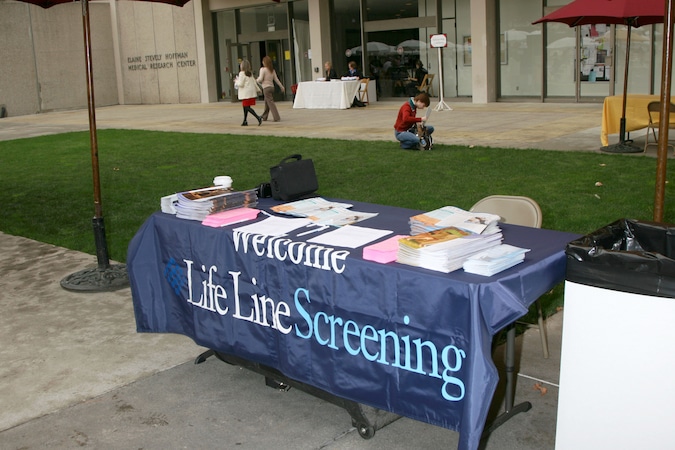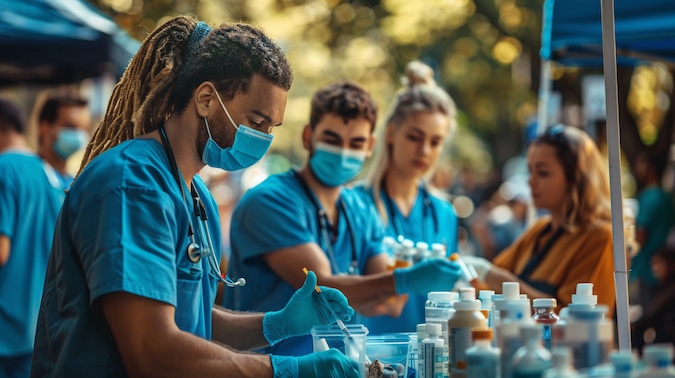
Promote Local Health Fairs for Community Well-Being

Local health events and fairs provide vital healthcare services and educational resources to communities. They offer free or low-cost health screenings, workshops, and a chance for individuals to connect with healthcare professionals. By participating, individuals can take control of their health while contributing to the community’s well-being. Additionally, organizations like SelfGood offer health insurance resources to help ensure that people remain covered for ongoing healthcare needs.
Local health events, such as health fairs and workshops, are community-driven initiatives that provide access to essential healthcare services, especially for individuals who may not have consistent access to medical care. These events also serve as educational platforms for promoting preventive care and healthy living. By engaging with local health events, communities can improve health outcomes, foster connections, and raise awareness about important health issues.
Key Takeaways:
- Local health events offer preventive care through free or low-cost screenings and education.
- They are accessible to all community members, especially vulnerable populations.
- These events foster community engagement and promote overall well-being.
- Marketing strategies like social media, local outreach, and partnerships are key to successful health fairs.
The Importance of Local Health-Related Events for Community Well-Being

Local health events play a vital role in improving public health. They provide accessible preventive care services, such as blood pressure screenings, cholesterol checks, and diabetes testing. These events are often the only opportunity some individuals have to engage with healthcare professionals, making them critical for underserved populations.
Moreover, these events often focus on education. Workshops and seminars inform the public about essential health topics, including chronic disease management, nutrition, mental health, and exercise. Through education, attendees learn how to make healthier lifestyle choices, resulting in improved long-term health outcomes for the community.
Types of Health Fairs and Local Health Events
There are several types of health fairs and local health events, each serving a unique purpose:
- Health Screenings and Check-ups:
Health fairs often offer free screenings for conditions like high blood pressure, diabetes, and cholesterol. These screenings provide early detection and allow attendees to address potential health concerns before they become more serious. - Educational Workshops and Wellness Seminars:
These events provide valuable information on topics such as fitness, stress management, and nutrition. For example, a mental health workshop might teach coping techniques for stress, while a fitness seminar could provide exercise demonstrations. - Specialized Events for Vulnerable Groups:
Certain health fairs cater to the specific needs of vulnerable populations, such as seniors, children, and low-income families. Services like vaccinations, dental check-ups, and nutritional counseling are tailored to the needs of these groups.
How to Find and Attend Local Health Fairs
Finding local health fairs is easier than ever thanks to digital platforms and traditional outreach methods. Here are some key ways to discover and attend these events:
- Online Resources and Platforms:
Websites such as the CDC’s National Public Health Events Calendar offer up-to-date information on health fairs happening in your area. Social media platforms like Facebook and Instagram also feature event announcements, while local health departments or government websites provide event listings. - Community Outreach and Word of Mouth:
Community centers, churches, and schools are great places to find out about local health events. Flyers, bulletin boards, and local newsletters are commonly used to promote health fairs to those who may not be active on social media. - Partnering with Local Organizations:
Local non-profits, healthcare providers, and small businesses often collaborate to spread the word about health fairs. Partnering with these organizations can expand outreach and ensure more people in the community know about the events.
Hosting a Successful Local Health Event
Organizing a successful health fair requires careful planning and execution. Here are some steps to ensure your event is both impactful and well-attended:
- Planning the Event:
Begin by selecting an accessible and convenient venue. Make sure the location is easy to reach, and consider offering transportation options for attendees who may have trouble getting there. Once the venue is set, coordinate with local healthcare providers and organizations to offer services and workshops. - Engaging Local Healthcare Providers:
Invite local doctors, clinics, and hospitals to participate in the event. Many providers are willing to offer free or reduced-cost screenings in exchange for community exposure. Volunteer medical staff, such as nurses or medical students, can also help manage the workload and keep costs down. - Creating an Interactive and Educational Experience:
An engaging event will keep attendees interested and increase their likelihood of participating in future health fairs. Incorporate interactive elements like fitness challenges, cooking demonstrations, and hands-on workshops to make the event enjoyable and informative. - Post-Event Follow-up and Evaluation:
Collect feedback from attendees through surveys or direct conversations. Understanding what went well and what could be improved helps in planning future events. This feedback is crucial for increasing the effectiveness and reach of future health fairs.
Promoting and Marketing Local Health Events

Effective promotion ensures that a health fair reaches the maximum number of attendees. Here are some marketing strategies to consider:
- Social Media Strategies for Health Event Promotion:
Promote your event using social media platforms like Facebook, Instagram, and Twitter. Create an event page on Facebook where users can RSVP and share the event with their friends. Use Instagram to post stories or images from past events to build excitement. - Engaging Local Media Outlets:
Reach out to local newspapers, radio stations, and TV channels to promote the event. A press release that highlights the event’s purpose, services, and importance for the community can generate media coverage and draw more attendees. - Collaborating with Local Influencers and Advocates:
Local influencers, health advocates, or community leaders can help promote the event to their followers. Their endorsements can lend credibility and reach new audiences. - Leveraging Email Newsletters and Flyers:
Email marketing is another effective tool. Partner with local organizations or businesses that have mailing lists to spread the word. Distribute flyers at schools, churches, and community centers to reach those who may not be online.
Benefits of Participating in Local Health Fairs
- Access to Free or Low-Cost Screenings:
Health fairs often offer services that would otherwise be costly, such as blood pressure checks, diabetes testing, or dental exams. These screenings provide an opportunity for early detection of health issues, which can lead to better long-term outcomes. - Health Education and Awareness:
Beyond screenings, health fairs educate the public about important health topics. Attendees leave with valuable information on managing chronic conditions, maintaining a healthy lifestyle, and improving their overall well-being. - Building a Stronger Community:
Health fairs strengthen community bonds by bringing people together for a common cause. These events foster a sense of unity and mutual support while addressing the healthcare needs of the community.
Final Thoughts
Local health events and fairs are invaluable resources for communities, providing access to healthcare services and health education that might otherwise be out of reach. These events not only offer preventive screenings and educational workshops but also help build a healthier, more connected community. By attending or hosting a health fair, individuals can take proactive steps toward better health while supporting their neighbors.
Frequently Asked Questions
How do I find local health events in my area?
You can find local health events through online platforms like the CDC’s Public Health Events Calendar, social media, and local government websites. Flyers and community boards at local organizations are also helpful.
Are the services at health fairs really free?
Many health fairs offer free services or provide them at a reduced cost. Always check the event details for specifics, but most aim to be accessible to all community members.
What should I bring to a local health fair?
Bring your ID, health insurance card (if applicable), and a list of medications you take. You should also bring any questions or concerns about your health to discuss with professionals at the event.
Sources:
- CDC. (n.d.). Public health events calendar. Centers for Disease Control and Prevention. Retrieved from https://www.cdc.gov
- American Heart Association. (n.d.). Community health resources. American Heart Association. Retrieved from https://www.heart.org
- Local Government Health and Wellness Programs. (n.d.). Retrieved from https://www.yourlocalgov.com




